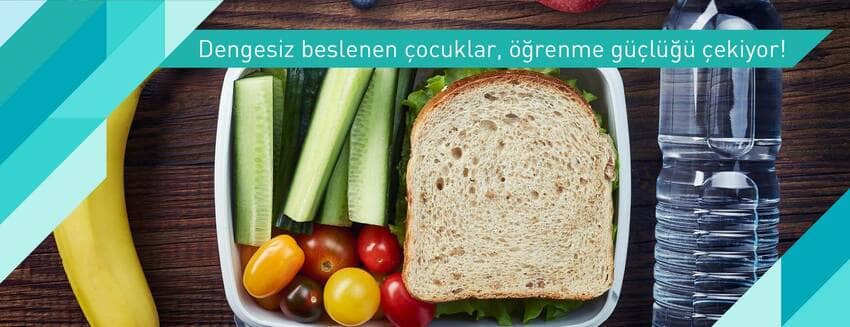
After the summer vacation, children's eating patterns and biological clocks have changed. While regular sleep time brings with it regular nutrition, a late breakfast leads to skipping meals. Experts, who recommend families to regulate children's sleep hours first, underlined that children with inadequate and unbalanced nutrition have short attention spans and have difficulty in learning.
Üsküdar University NPISTANBUL Hospital Nutrition and Diet Specialist Özden Örkcü gave important information about proper nutrition for children.
Organize your child's sleep time
"Regular sleep time brings with it regular nutrition. Therefore, the first thing to start with is to regulate children's sleep hours." Özden Örkcü said, "A late breakfast will lead to skipping meals. Breakfast at lunchtime will lead to skipping lunch and limited and unbalanced intake of essential nutrients (milk group, meat group, grain group, fat group, vegetables and fruits)."
Improper nutrition shortens attention span in children
Stating that irregular nutrition negatively affects the development of children, Örkcü emphasized that malnourished children's growth and development are hindered, their attention span is shortened, their perception decreases and they have difficulty in learning. Örkcü expressed the nutrients that have an important place in terms of health as follows:
"Fiber foods: It is especially important for developing regular bowel habits in childhood. In addition, fiber is known to reduce the risk of cardiovascular diseases, Type 2 diabetes and some types of cancer that occur later in life by lowering blood cholesterol and glucose levels.
Yogurt: Fat is a very important food source for brain health. Especially full-fat yogurt supports cell membrane development by increasing brain activity. With a few pieces of dark chocolate that you can add to yogurt, you can increase brain blood flow and keep your child's mind more active.
Greens: Packed with folate and vitamins, greens such as spinach and kale are part of a healthy diet that reduces your child's risk of developing dementia later in life. Spinach and kale chips, especially with eggs, help new brain cells grow.
Fish: Natural oily fish is a good source of vitamin D. To protect your child's brain against cognitive decline and memory loss, feed them fish with Omega-3 such as salmon, tuna and sardines.
Natural meat: Choose meats that do not contain artificial substances, dyes, flavors, preservatives and sweeteners. Avoid processed foods such as salami, sausage and pepperoni.
Nuts and seeds: Packed with protein, essential fatty acids, vitamins and minerals, nuts and seeds keep your child's nervous system happy.
Oatmeal: Rich in protein and fiber, oatmeal protects the heart and brain vessels. One study found that children who ate sweetened oatmeal did better on academic tasks related to memory than children who ate sugary cereals. Use cinnamon instead of sugar to sweeten foods. Spice compounds help protect brain cells."
Uniform diet causes anemia
Özden Örkcü said, "One of the most common problems in children due to wrong and uniform nutrition is anemia" and listed the causes of anemia as follows:
- "Lack of diversity in foods,
- Milk quantity more than 600 ml
- Excessive consumption of sweets, biscuits, chips, tea, instant fruit juices, etc,
- Inadequate sources of iron,
- Inadequate hygiene conditions,
- Low socio-economic status,
- Lack of knowledge."
Özden Örkcü stated that the daily energy requirement of school children varies between 1600-2200 calories, depending on activity, and underlined that 50-60% of energy should be provided from carbohydrates, 25-35% from fats and -15% from proteins.
Take this program into consideration!
Nutrition and diet specialist Özden Örkcü explained the daily nutrition program for children:
"Breakfast: 1 glass of milk + 1 boiled egg or cheese omelet + 2 slices of whole wheat bread + 1 teaspoon of jam or honey molasses + 3-4 olives or 2 walnuts
Snack 1 cup freshly squeezed fruit juice
Lunch: Grilled meat, chicken, fish + 4-5 tablespoons of rice or pasta
Snack: 2 tablespoons yogurt + honey or molasses + 2 tablespoons oats
Dinner: Vegetable dish + 2 tablespoons yogurt or 1 cup buttermilk + 2-3 tablespoons rice or pasta or 1-2 slices of whole wheat bread
Snack 1 glass of fruit milk (homemade + 10 almonds or 2 walnuts)
Should be fed without skipping meals
"Children should be fed regularly and without skipping meals," said Nutrition and Diet Specialist Özden Örkcü and concluded her words as follows: "For a good eating habit, children should be fed from every food group. They should not insist on foods they do not like and should be given similar foods from the same group. Sugar, biscuits, tea, soda, cola drinks should not be given in snacks."
